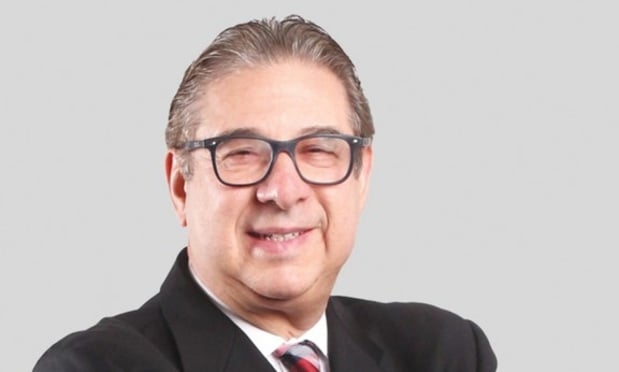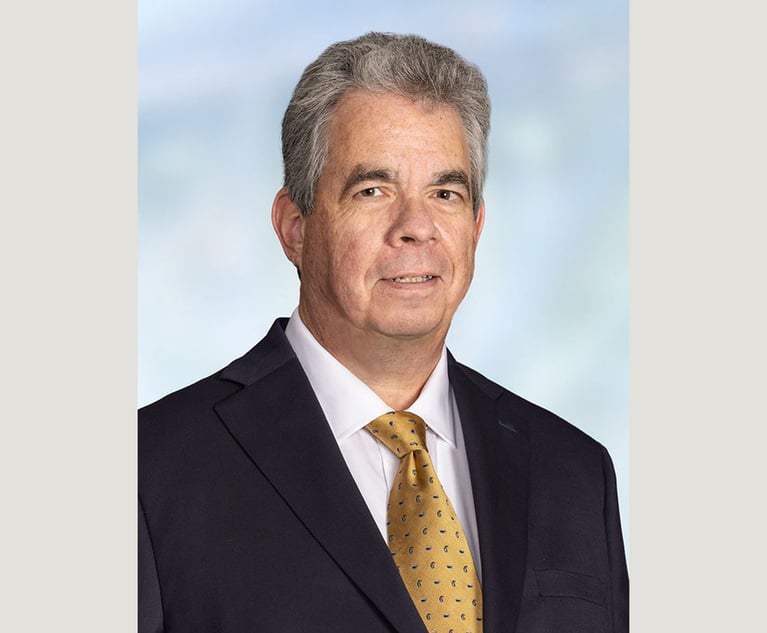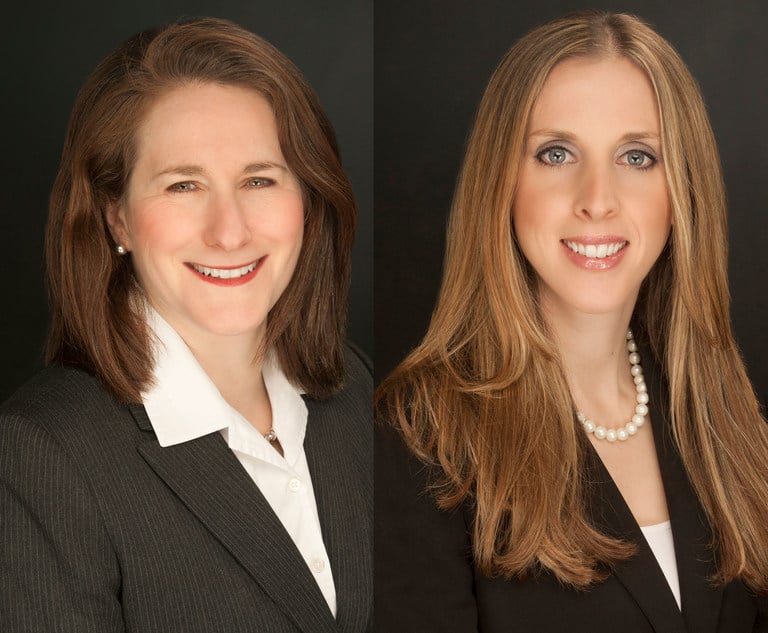What Constitutes Actionable Franchise Fraud?
The Federal Trade Commission's Rule of 1979 governs the offer and sale of franchises. The intent of the rule is to require a franchisor to give every prospective franchise buyer a uniform written disclosure containing the essential information about the franchise offering.
June 18, 2020 at 01:09 PM
7 minute read
 Craig Tractenberg of Fox Rothschild.
Craig Tractenberg of Fox Rothschild.The Federal Trade Commission's Rule of 1979 governs the offer and sale of franchises. The intent of the rule is to require a franchisor to give every prospective franchise buyer a uniform written disclosure containing the essential information about the franchise offering. This written document is called a franchise disclosure statement or an FDD for short. What if the information required by the FTC rule is inaccurate or incomplete? Or perhaps it was important information to the purchaser, but not required to be disclosed under the rule, and may have also been wildly inaccurate or misleading. When is such information actionable?
Among the information required is the background and history of the franchisor and its key personnel, including relevant litigation and bankruptcy history, information about initial investment and fees to be paid to operate, the identification of the quality of the trademarks, and balance sheets and income statements of the franchise company. This information is contained in the franchise disclosure document, which has exhibits of the names, addresses and telephone numbers of the franchisees and statistical information about the number and location of the franchises. The purpose of providing franchisee contact information is to allow the prospect to call or visit the franchisees to learn of their experience. What if the list is inaccurate, not disclosed or the franchisees do not really exist? Could a dishonest franchise seller really fabricate a list of franchisees in its system, and why would they do that?
Of course every prospective franchisee wants to know how much can they make? The FTC rule requires that if a franchise seller desires to make a statement regarding "franchise performance representations," the statement must be substantiated, must adhere to a particular format, and must be contained in the FDD, with appropriate information to make it representative of the franchise being sold. Requiring the FPRs to be contained in the FDD is evidentiary and intended to prevent fraud.
Must You Prove Reliance to Win a Fraud Case?
Note that the FTC rule is a mere rule and not a law. It may be enforced by the FTC but not by private individuals. Most states have what are referred to as mini-FTC rules, which incorporate by reference the standards of the FTC such that a violation of an FTC rule is also a violation of the mini-FTC rule of the state. In addition to the mini-FTC rules, some states have franchise anti-fraud laws. For those which do not, the FTC rule requirement has been used to establish the standard of conduct in the sale of franchises, and the failure to comply with the standard can be enforced as a fraudulent or negligent nondisclosure.
If the claim comes within an anti-fraud statute, most statutes do not require proof of reliance for violations of the FTC rule. Otherwise, the claimant must prove reliance to prevail, which is not so simple because franchise agreements contain integration clauses. These clauses generally support the defense that if the false statement is not in writing, then the false statement is not actionable. Some courts strictly apply this notion. Others do not. It depends on the jurisdiction and the cases decided under that state law.
Notwithstanding the obligatory disclosures and the regime for enforcing or redressing inaccurate or nondisclosures, fraudulent franchise sales still exist.
The Unscrupulous Franchise Seller
In FTC v. Car Checkers of America, the Federal Trade Commission enjoined the franchisor from continuing to sell franchises and froze its assets for the benefit of those previously defrauded. It seems the franchisor had fabricated the existence of franchisees in the Midwest, outside of the Mid-Atlantic states where it had been selling franchises. When a prospect met with the franchisor, the franchisor would tell the prospect to call the franchisees in the Mid-west who were doing very well. The prospect would leave a voice mail, and the purported franchisee would return the call explaining to the prospect how wonderful the franchise system was, The purported franchisee was a mere actor, using a specially established phone line, and had no connection to the operation of a business in the Mid-west. The only way that the scam could have been avoided by a prospect was for a prospect to visit or have another visit the purported Mid-West operations. Note that the financial statements of the franchisor did not reflect the purported success of the purported franchisees because the franchise fee revenues did not match up.
The Sharp Franchise Seller
This is a franchisor that skirts the disclosure laws. Usually you have a warning about these sellers. They have a history of disclosure violations, sometimes disclosed in the FDD, and other times only available through an electronic investigation. They often have a long history of selling franchises and know the ins and outs of selling franchises. Some of the sharp practices are steering a prospect to call certain franchisees far from the prospect, so that the prospect does not visit the local locations. The salesperson may insist on being on the phone or present during a diligence call, which merely inhibits the conversation. The seller may have a power point presentation with material representations, including statements of how much you can earn, which may not be given in compliance with the FTC rule.
The way to guard against problems with this seller is to conduct a background investigation and conduct diligence on the seller and the system. Do not rely solely on the representations in the FDD. They may be accurate but not the full story. They may be inaccurate, because no governmental agency conducts diligence on the accuracy of the FDD. Some states screen the FDD where the franchise must be registered before a franchise sale can occur. This is no substitute for diligence.
The Puffer
Puffery is the use of statements of opinion to sell a product or service. Opinions are not facts, so they cannot constitute fraudulent statements. Typical puffery which occurs in the sale of franchises claim that the prospect can get on the ground floor of a new movement or consumer demand, and that this franchise is the best, the biggest, the best financed, or the smartest solution to meet this demand. Absent special circumstances where the seller might be in a position of special knowledge, none of these opinion statements are actionable.
How to Guard Against Franchise Fraud
My advice is to start with competent franchise counsel. Equally important is the diligence that must be conducted on the seller and the system by both the counsel and the prospect. Red flags such as missing information in the FDD, less than complete explanations about how the business works and its competitive advantages over other competitors, and previous franchise law violations need to be drilled down upon.
In my experience, most franchise systems are good values and the people are honorable. Others, unfortunately, are not so honorable and the stakes are high. Prospects are investing their total wealth and life savings in these business offerings, so the cost of counsel and diligence is well worth it. There are third-party rating services that compare franchise offerings based on statistics, such as Frandata and FranchiseGrade.com. When private equity buys franchise systems, these services are used to evaluate the systems. Franchise prospects could use these services as well.
Craig R. Tractenberg is a partner and co-chair of the franchise and distribution practice group at Fox Rothschild where he handles complex business disputes involving intellectual property, licenses, business torts and insolvency issues. He focuses his practice on franchise companies' development and expansion. Contact him at [email protected].
This content has been archived. It is available through our partners, LexisNexis® and Bloomberg Law.
To view this content, please continue to their sites.
Not a Lexis Subscriber?
Subscribe Now
Not a Bloomberg Law Subscriber?
Subscribe Now
NOT FOR REPRINT
© 2025 ALM Global, LLC, All Rights Reserved. Request academic re-use from www.copyright.com. All other uses, submit a request to [email protected]. For more information visit Asset & Logo Licensing.
You Might Like
View All
Former Perkins Coie Partner Moves to Stradley Ronon in Chicago

Proskauer Rose Investment Management Trio Jumps to Stradley Ronon


Stradley Ronon Bolsters Investment Management Practice With Vanguard Hire
4 minute readLaw Firms Mentioned
Trending Stories
- 1The End of Innocence? DEP’s End Run Around ‘All Appropriate Inquiry’ Spill Act Protections
- 2Pistachio Giant Wonderful Files Trademark Suit Against Canadian Maker of Wonderspread
- 3New York State Authorizes Stand-Alone Business Interruption Insurance Policies
- 4Buyer Beware: Continuity of Coverage in Legal Malpractice Insurance
- 5‘Listen, Listen, Listen’: Some Practice Tips From Judges in the Oakland Federal Courthouse
Who Got The Work
J. Brugh Lower of Gibbons has entered an appearance for industrial equipment supplier Devco Corporation in a pending trademark infringement lawsuit. The suit, accusing the defendant of selling knock-off Graco products, was filed Dec. 18 in New Jersey District Court by Rivkin Radler on behalf of Graco Inc. and Graco Minnesota. The case, assigned to U.S. District Judge Zahid N. Quraishi, is 3:24-cv-11294, Graco Inc. et al v. Devco Corporation.
Who Got The Work
Rebecca Maller-Stein and Kent A. Yalowitz of Arnold & Porter Kaye Scholer have entered their appearances for Hanaco Venture Capital and its executives, Lior Prosor and David Frankel, in a pending securities lawsuit. The action, filed on Dec. 24 in New York Southern District Court by Zell, Aron & Co. on behalf of Goldeneye Advisors, accuses the defendants of negligently and fraudulently managing the plaintiff's $1 million investment. The case, assigned to U.S. District Judge Vernon S. Broderick, is 1:24-cv-09918, Goldeneye Advisors, LLC v. Hanaco Venture Capital, Ltd. et al.
Who Got The Work
Attorneys from A&O Shearman has stepped in as defense counsel for Toronto-Dominion Bank and other defendants in a pending securities class action. The suit, filed Dec. 11 in New York Southern District Court by Bleichmar Fonti & Auld, accuses the defendants of concealing the bank's 'pervasive' deficiencies in regards to its compliance with the Bank Secrecy Act and the quality of its anti-money laundering controls. The case, assigned to U.S. District Judge Arun Subramanian, is 1:24-cv-09445, Gonzalez v. The Toronto-Dominion Bank et al.
Who Got The Work
Crown Castle International, a Pennsylvania company providing shared communications infrastructure, has turned to Luke D. Wolf of Gordon Rees Scully Mansukhani to fend off a pending breach-of-contract lawsuit. The court action, filed Nov. 25 in Michigan Eastern District Court by Hooper Hathaway PC on behalf of The Town Residences LLC, accuses Crown Castle of failing to transfer approximately $30,000 in utility payments from T-Mobile in breach of a roof-top lease and assignment agreement. The case, assigned to U.S. District Judge Susan K. Declercq, is 2:24-cv-13131, The Town Residences LLC v. T-Mobile US, Inc. et al.
Who Got The Work
Wilfred P. Coronato and Daniel M. Schwartz of McCarter & English have stepped in as defense counsel to Electrolux Home Products Inc. in a pending product liability lawsuit. The court action, filed Nov. 26 in New York Eastern District Court by Poulos Lopiccolo PC and Nagel Rice LLP on behalf of David Stern, alleges that the defendant's refrigerators’ drawers and shelving repeatedly break and fall apart within months after purchase. The case, assigned to U.S. District Judge Joan M. Azrack, is 2:24-cv-08204, Stern v. Electrolux Home Products, Inc.
Featured Firms
Law Offices of Gary Martin Hays & Associates, P.C.
(470) 294-1674
Law Offices of Mark E. Salomone
(857) 444-6468
Smith & Hassler
(713) 739-1250





